What Is Teacher Misconduct?
Teacher misconduct refers to any behavior by an educator that violates expectations or legal obligations. While some forms of misconduct involve criminal acts, others may involve inappropriate behavior that breaches the trust placed in teachers without necessarily breaking the law.
Misconduct can take many forms, including unprofessional communication with students, favoritism, boundary violations, or inappropriate relationships. These early signs, while not always criminal, can signal a growing risk of abuse. Many cases of physical or sexual abuse are preceded by more minor violations that were ignored or not taken seriously.
This guide covers how teacher misconduct is defined, how complaints are reported, and what happens when a teacher is investigated. It also outlines school liability, the legal rights of victims, and how misconduct can affect a teacher’s license, employment, and standing within the teaching profession.
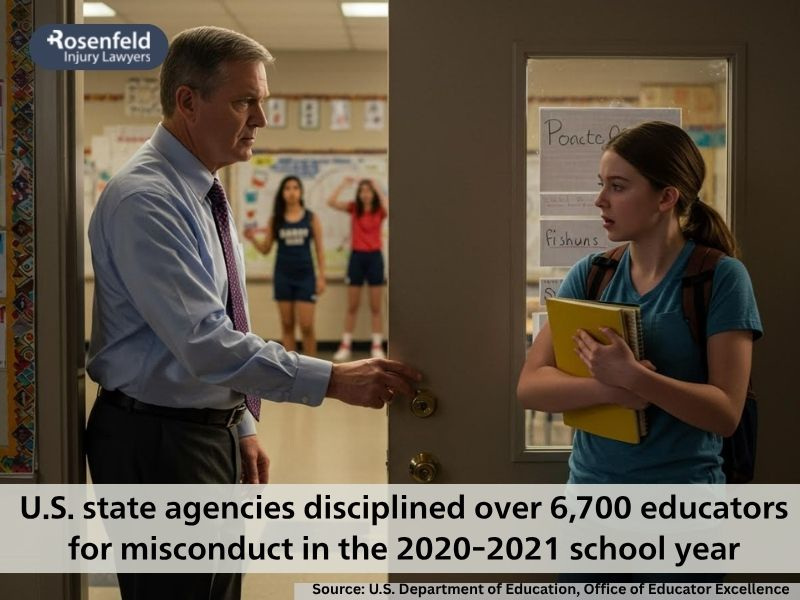
What Are the Types of Educator Misconduct?
Teachers are entrusted with far more than lesson plans–they’re given responsibility over the safety, well-being, and emotional development of children. When that trust is broken, the effects can be lasting and devastating. Educator misconduct violates not only professional standards but also the basic expectations every parent and student has for a safe learning environment.
Sexual Misconduct
Sexual misconduct includes any inappropriate sexual behavior or contact between a teacher and a student, which can involve suggestive messages, unwanted touching, sexual comments, or even sexual assault. Even if a student appears cooperative, the law recognizes that minors cannot consent to sexual relationships with authority figures. Most states consider these acts both unethical and criminal.
Physical Abuse
This includes any form of violence, aggression, or physical punishment that causes harm or fear in a student, ranging from hitting or slapping to grabbing, pushing, or restraining a child inappropriately.
Corporal punishment is banned in many states, and where it’s still allowed, it’s highly regulated. Any act that crosses the line into excessive force—or is used as a form of punishment without following state law—can be considered abuse.
Emotional or Psychological Abuse
Emotional or psychological abuse includes verbal attacks, humiliation, intimidation, or persistent negative treatment that affects a student’s mental health. A teacher who mocks a student, threatens them, singles them out unfairly, or intentionally isolates them may be engaging in emotional abuse.
This type of misconduct can cause anxiety, depression, or long-term trauma. While harder to prove than physical, emotional abuse still violates standards and may be grounds for legal action or termination.
Negligent Supervision
Negligent supervision occurs when a teacher fails to act on known risks or ignores dangerous behavior happening under their watch. This can include allowing bullying to continue unchecked, not intervening in fights, leaving students unsupervised, or failing to report warning signs of abuse.
In some cases, educators who knew—or should have known—about ongoing risks but failed to take action may be held legally responsible for resulting harm.
Boundary Violations
Boundary violations are often early warning signs of more serious misconduct. These behaviors may not be illegal on their own, but still fall outside the ethical standards of the teaching profession. Examples include giving a student gifts, showing favoritism, spending time alone with a student without a valid reason, or communicating excessively through texts or social media. A teacher who shares personal details or seeks emotional closeness with a student may be blurring professional lines. These actions are concerning because they often lay the groundwork for grooming or abuse. Schools should address boundary concerns early to prevent escalation.
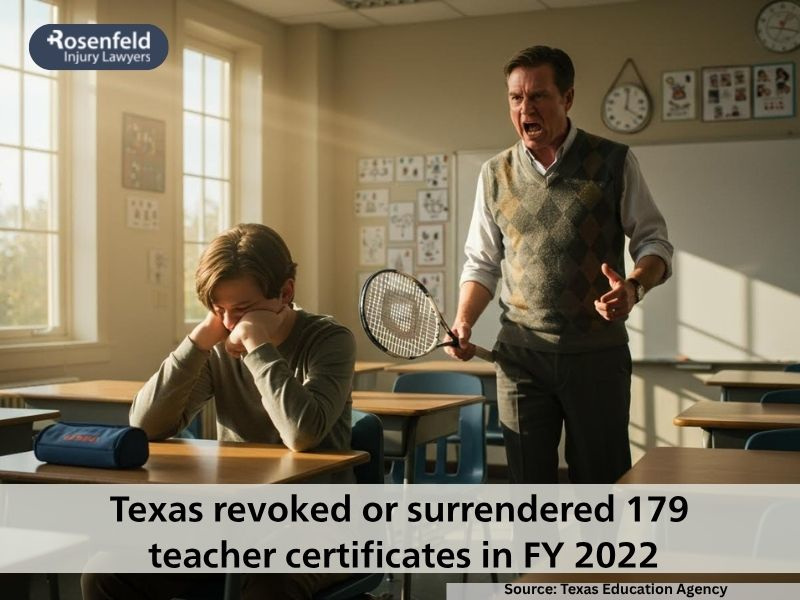
How Common Is Teacher Misconduct?
An estimated 1 in 10 students will experience school employee sexual misconduct before they graduate high school. This includes both physical and non-contact misconduct, such as sexual comments, grooming, or inappropriate messages.
- 93% of reported cases happened in public schools
- 26% of incidents occurred in urban schools, 37% in suburban areas
- 49% of schools affected had a majority-minority student body; 53% served economically disadvantaged students
- 52% of cases were concentrated in the southern U.S
- 53% of offenses occurred during school events, 51% off-campus, and 19% online
- Three out of four offenders used technology, like mobile phones, to communicate with victims
- Most of the victims were high school students (62%), with an average age of 15
- 56% of the victims were female
- Many experienced serious emotional consequences, including long-term psychological harm
- The average age of offenders was 36, and 85% were male
- 68% were general education teachers; 21% were coaches; 9% were music/art teachers
- 50% had prior allegations before being removed
- 47% of repeat offenders had at least two victims; 16% had five or more
- 36% were placed on administrative leave, and 24% resigned
- 90% of offenders were eventually convicted
- Only 39% were required to register as sex offenders
- The average prison sentence was 47 months
One troubling pattern is known as “passing the trash,” where teachers accused of misconduct are quietly transferred to other schools instead of being reported to law enforcement. On average, an offending teacher may work at three different schools before their behavior is formally addressed. This delay can lead to additional victims and prolonged harm.
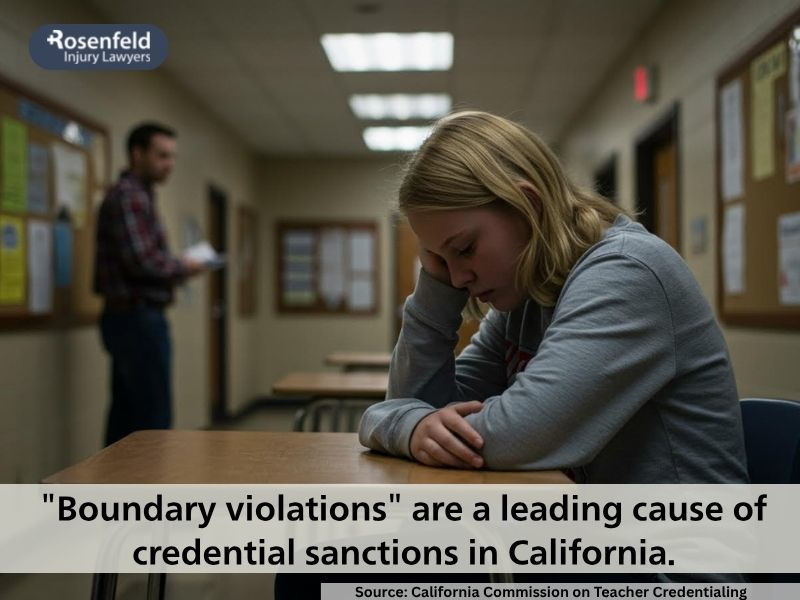
What Laws Govern Teacher Misconduct?
Several federal laws protect students from abuse and harassment by teachers, especially in schools that receive public funding.
Title IX of the Education Amendments of 1972 (20 U.S.C. § 1681) prohibits sex-based discrimination in any educational program or activity receiving federal funds. This includes sexual harassment, abuse, or misconduct by teachers and staff.
Under Title IX, schools must take immediate and appropriate steps to stop the harassment, prevent it from recurring, and address its effects. A school that ignores or mishandles reports of misconduct may be held liable for violating a student’s rights under this law.
Civil Rights Act – Section 1983 (42 U.S.C. § 1983) allows individuals to file civil lawsuits against public officials, including school administrators, for violating constitutional rights.
This often applies when a school shows deliberate indifference to known abuse, such as failing to act when misconduct allegations are made. Victims may sue for violations of their bodily integrity or other protected rights under the Constitution.
Child Abuse Prevention and Treatment Act (CAPTA, 42 U.S.C. § 5106a) sets the federal framework for reporting suspected child abuse and neglect, including abuse committed by teachers.
States receive federal funding under CAPTA only if they implement mandatory reporting laws, which typically require teachers, school administrators, and counselors to report any suspicion of abuse to child protection services or law enforcement. Failure to report may result in both criminal and professional consequences.
Federal Criminal Laws (18 U.S.C. §§ 2241–2252, 1591) cover crimes such as sexual exploitation of children, online solicitation, human trafficking, and the production or possession of child sexual material.
While schools and state education departments usually lead the initial investigation into misconduct, severe cases often involve federal law enforcement when these violations are suspected, especially when digital communication or trafficking is involved.
Together, these laws form the backbone of legal protection for students nationwide. However, they are further shaped by laws at the state level, typically through the state department of education.
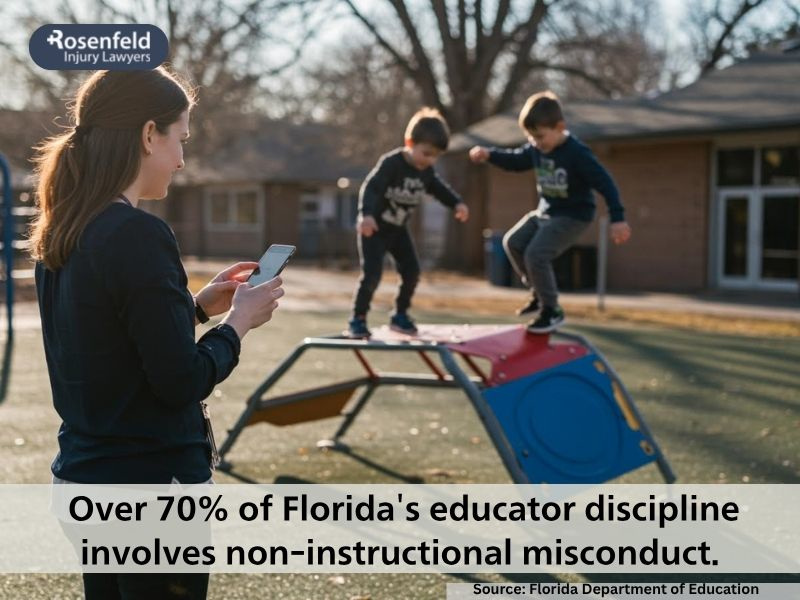
What Consequences Do Teachers Face for Misconduct?
Teachers who engage in misconduct face a range of consequences, depending on the severity of their actions, state law, and whether they violated criminal statutes or school policies.
While not every case results in criminal charges, schools and state agencies still have the authority to impose severe penalties to protect students and uphold ethical standards.
Disciplinary Action
Disciplinary action refers to the professional penalties imposed by a school, school district, or state education agency in response to misconduct. These actions are designed to address violations of conduct and maintain student safety, even if the teacher is not charged with a crime.
Typical forms include:
- A formal written reprimand
- Placement on probation or heightened supervision
- Suspension with or without pay
- Reassignment away from students
- Termination or dismissal from employment
In most states, if a teacher is disciplined for serious misconduct—especially involving sexual relationships—the school is legally required to report the discipline to the state licensing or education authority. This ensures that misconduct is documented beyond the local level and may trigger further action, including certificate review or investigation by the state.
Revocation or Suspension of an Educator’s Certificate
Teachers found responsible for serious misconduct can lose their license to teach. This typically happens through a process that begins with an investigation by the state’s department of education.
The process usually includes:
- Initial investigation by the school or state agency
- Referral to a licensing board or the education bureau
- Administrative hearing, where evidence is presented and the teacher may respond
- A final decision on sanctions, such as revocation, suspension, or voluntary surrender of the certificate
While revocation is not a criminal penalty, it has serious long-term effects. Once a certificate is revoked or suspended, the teacher cannot legally teach in that state. In most cases, the action is also reported to the NASDTEC Clearinghouse.
This national registry allows state directors and licensing agencies across the U.S. to track certificate status and flag teachers with a history of misconduct, helping prevent those found guilty of misconduct from quietly moving between states or school districts.
Criminal Charges
When a teacher’s misconduct rises to the level of a criminal offense—such as sexual assault, exploitation, or possession of child sexual material—they may face criminal charges under state or federal law. These are some of the most serious consequences a teacher can face, and they often carry felony-level penalties.
Possible criminal penalties include:
- Imprisonment (sometimes years, depending on the offense)
- Fines
- Probation
- Mandatory registration as a sex offender
Criminal investigations are typically conducted by law enforcement, often in coordination with the school and state child protective services. Schools have a legal obligation to cooperate fully with these investigations.
If a school administrator is found to have ignored allegations, failed to report known abuse, or concealed misconduct, they may also face civil liability or federal scrutiny, especially under Title IX or Section 1983.
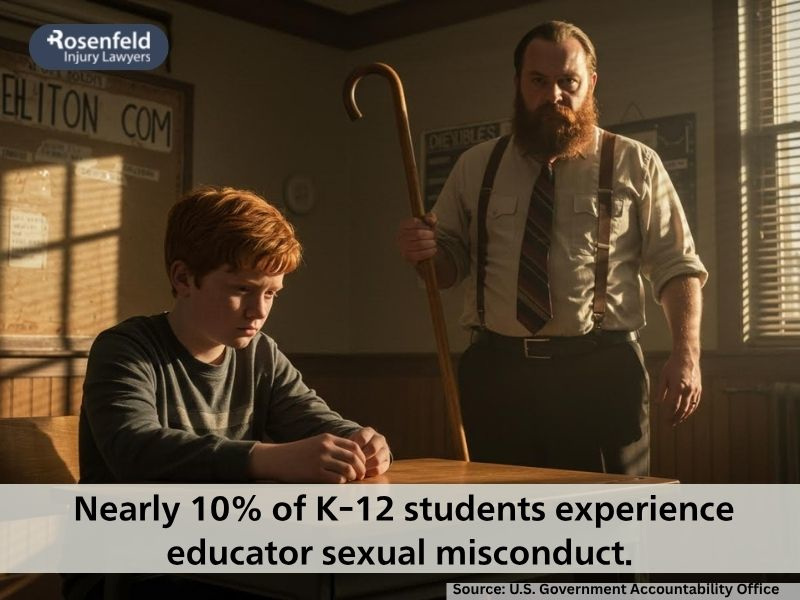
Who Is Liable for Teacher Misconduct?
When a teacher abuses their position of trust, they aren’t the only one who may bear responsibility. Schools and related institutions have a legal and ethical duty to protect students. When that duty is breached, civil lawsuits may be filed under legal theories such as:
- Negligence or gross negligence (failure to act with reasonable care)
- Failure to protect or deliberate indifference (ignoring known risks or complaints)
- Vicarious liability (also known as respondeat superior), where institutions are held responsible for the actions of employees committed within the scope of their job
School Administrators and Supervisors
Principals, assistant principals, department heads, and other supervisory staff may face direct liability when they fail to act on reports of misconduct–such as romantic relationships, grooming behavior, or repeated boundary violations.
Administrators may be sued individually when they:
- Dismiss or ignore credible complaints
- Fail to investigate reports properly
- Retaliate against students or staff who report abuse
- Allow a teacher to remain in the classroom despite known misconduct
School Districts and Boards
School districts and boards can be held liable for broader, systemic failures, including:
- Negligent hiring, such as employing someone with a known history of abuse
- Negligent retention, where a teacher is kept on staff despite misconduct allegations
- Failure to enforce mandatory reporting policies
- Failure to train or monitor staff regarding professional conduct and abuse prevention
Civil claims often target the district’s failure to follow required protocols or maintain oversight of the teaching staff. In many cases, the district knew—or should have known—about misconduct but took no meaningful steps to stop it.
Private or Charter School Organizations
Unlike public schools, private and charter schools are not shielded by government immunity and are generally subject to state tort law. This means families can pursue lawsuits for negligence or breach of duty of care more easily.
Liability may fall on:
- Charter management organizations
- School owners or boards
- Nonprofit entities overseeing the school
Claims often arise when the organization fails to conduct background checks, ignores past misconduct records, or lacks policies for monitoring teacher behavior.
State Education Agencies
While state education departments often have some level of immunity, they may still be scrutinized in rare cases where licensing failures or inaction allowed abuse to continue.
For example, if a teacher had a history of substantiated complaints in multiple school districts, and the state agency failed to revoke or suspend the teacher’s certificate, a claim might be made that the agency enabled ongoing misconduct. These cases are uncommon but may be viable when there is evidence that multiple warnings were ignored by those with authority to act.
Churches, Religious Orders, or Affiliated Institutions
In religious or parochial schools, liability may extend to dioceses, ministries, or religious orders that exercise control over the school and its staff. These organizations can be held responsible under vicarious liability, particularly if they:
- Appointed or approved the teacher’s role
- Oversaw hiring or supervision
- Played a role in covering up prior misconduct
These institutions are often at the center of clergy abuse litigation for shielding abusers or quietly reassigning them.
Third-Party Contractors or Volunteers
If a school allows a third-party adult to work closely with students without background checks or oversight, it can be liable for negligent supervision or failure to protect.
Liable parties may also include:
- Volunteers in extracurricular programs
- Mentors or club sponsors
- Contractors hired for school events or field trips
Law Enforcement or Child Protective Services (CPS)
In rare cases, law enforcement agencies or CPS may face civil claims when they fail to investigate reports properly, especially if their inaction allows ongoing abuse. They might be liable when:
- Multiple credible reports were made about a teacher
- Authorities had clear warnings but declined to investigate or intervene
- Their inaction directly contributed to harm
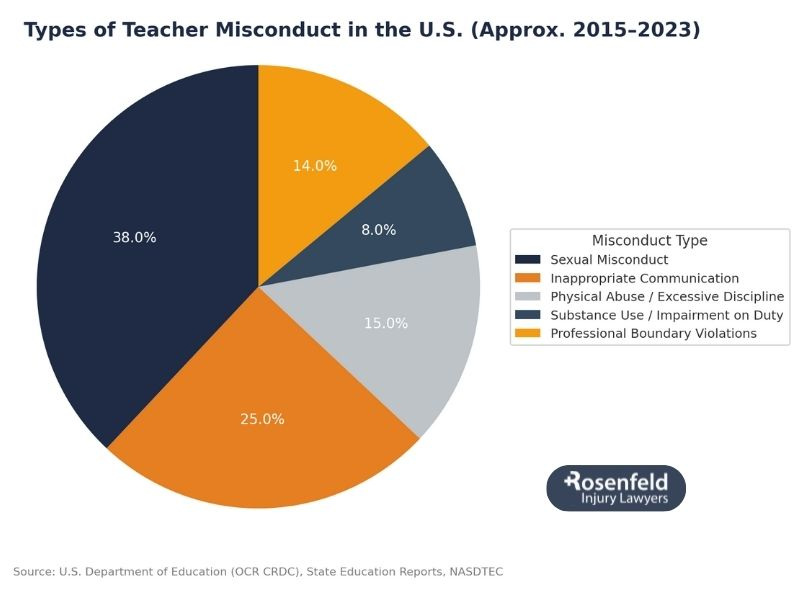
What Legal Options Do Victims of Teacher Misconduct Have?
Students who experience abuse or misconduct by a teacher may have strong legal options beyond filing a complaint with the school.
Criminal proceedings may apply when misconduct involves sexual contact, assault, grooming, exploitation, or child endangerment. While schools are legally required to report suspected abuse, families can go directly to police or child protective services if the school fails to act.
A criminal conviction can support a civil case, though victims don’t have to wait for charges to pursue compensation. Civil lawsuits allow victims to seek financial recovery for emotional trauma, therapy costs, educational setbacks, and more.
Title IX claims may apply if the misconduct created a hostile educational environment. Schools that fail to investigate or protect students can be held liable for discrimination under federal law. These claims often lead to institutional reform and, in some cases, monetary damages.
Section 1983 claims allow victims to sue individual administrators or boards for violating constitutional rights, especially when there’s clear evidence of deliberate indifference to known abuse.
What Damages Can Teacher Misconduct Victims Recover in Civil Lawsuits?
Victims may pursue civil lawsuits to recover compensation for the harm they’ve suffered. Compensatory damages cover emotional distress, pain and suffering, therapy costs, and other medical or psychological treatment. If the misconduct disrupted a student’s education, damages may also include expenses for tutoring, school transfers, or counseling.
In cases involving gross negligence or willful misconduct—such as a school ignoring repeated complaints—courts may award punitive damages to punish the institution and deter future abuse. Victims may also recover economic damages, such as lost wages for a parent who missed work or future income loss caused by long-term trauma.
Under Title IX or Section 1983, additional remedies may include attorney’s fees and court costs, especially where schools or administrators failed to act on known risks. These legal claims help hold teachers, districts, and education agencies accountable for failing to protect students.
How Long Do Victims of Teacher Misconduct Have to Take Legal Action?
The deadline to file a lawsuit varies by state. These deadlines are known as statutes of limitations, and they can determine whether a victim is still eligible to bring a civil claim. Many states have extended these time limits for survivors of childhood abuse, recognizing that trauma often delays disclosure for years.
In California teacher abuse lawsuits, victims can generally file claims until age 40 or within five years of discovering the abuse, whichever is later. California has also passed revival laws in the past, briefly reopening the window for older claims, especially against institutions like schools.
Connecticut teacher abuse lawsuits must be filed before the victim turns 51. The state does not follow a “discovery rule” for childhood abuse, meaning lawsuits must be brought based on age, not the time of realization.
For Florida teacher abuse lawsuits, there is no statute of limitations for civil cases involving abuse of a minor under age 16. Victims can file at any time, regardless of how long ago the abuse happened. This open-ended window applies broadly, but additional notice requirements may apply if the abuse occurred in a public school setting.
The statute of limitations for Illinois teacher abuse lawsuits has been eliminated for most survivors of childhood abuse. Victims can file at any age, and delays based on trauma are often considered reasonable. Lawsuits against school districts or private schools may still face procedural challenges, but time limits are generally not a barrier.
Recent legal changes have expanded options for Maryland teacher abuse lawsuits. In 2023, Maryland removed time limits for civil claims involving child abuse and opened the door for victims to file previously expired claims. The law applies to both individual offenders and institutions, including schools and religious organizations.
For New Jersey teacher abuse lawsuits, victims may bring civil claims until age 55 or within seven years of discovering the abuse, whichever is later. A two-year revival window that began in 2019 allowed older claims to be filed but has since closed. However, the current extended timeframes remain in place for new cases.
Following legislative changes, New York teacher abuse lawsuits can now be filed at any age. The state also enacted the Adult Survivors Act, which allowed adult victims to file previously expired cases through a one-year revival period that ended in 2023. Childhood abuse victims, however, continue to benefit from an open filing window.
The statute of limitations for Pennsylvania teacher abuse lawsuits currently allows victims to file claims until they turn 30. However, lawmakers have introduced measures that would eliminate time limits entirely or create a temporary look-back window. These proposals remain pending, so victims with older claims should seek legal advice promptly.
Washington teacher abuse lawsuits can be filed three years from the date they realize the abuse caused significant harm, as the discovery rule allows many survivors to file claims even decades later, especially when trauma delayed reporting or awareness of the abuse’s impact.
How to Report Teacher Misconduct
If you suspect or have experienced misconduct by a teacher, taking action quickly is essential–for your safety and to prevent further harm.
- Report the misconduct to school leadership (principal, superintendent) and request a written acknowledgment of your complaint.
- File a report with local law enforcement or your state’s Child Protective Services if abuse, exploitation, or endangerment is involved.
- Contact the school’s Title IX coordinator if the school receives federal funding and the misconduct involves sexual harassment or abuse.
- Preserve all evidence–save messages, screenshots, photos, and gather witness statements or journal entries that document the misconduct.
- Seek emotional support through counseling, school psychologists, or local survivor support groups and advocacy organizations.
- Consult an attorney experienced in teacher abuse litigation to understand your rights and potential legal options.
How Injury Lawyer Team Can Help
At Injury Lawyer Team, we understand how painful and isolating it can feel to come forward after experiencing misconduct by a trusted authority. If you’re reading this, know that you’re not alone, and we’re here to support you every step of the way.
Our sexual abuse law firm works closely with survivors and families to thoroughly investigate each case. We help uncover internal records, prior complaints, and disciplinary history that schools may try to keep quiet. We also know how to navigate government immunity laws and other legal hurdles that often discourage victims from pursuing justice.
We coordinate with law enforcement, advocacy groups, and trauma-informed professionals to make sure your voice is heard safely and respectfully. Your privacy matters, and we handle every case with care, compassion, and complete confidentiality.
We work on a contingency-fee basis, which means you owe nothing unless we’re able to help. If you’re ready to talk, we offer a free consultation with no obligation. We stand with you, and we believe in your case.
All content undergoes thorough legal review by experienced attorneys, including Jonathan Rosenfeld. With 25 years of experience in personal injury law and over 100 years of combined legal expertise within our team, we ensure that every article is legally accurate, compliant, and reflects current legal standards.








